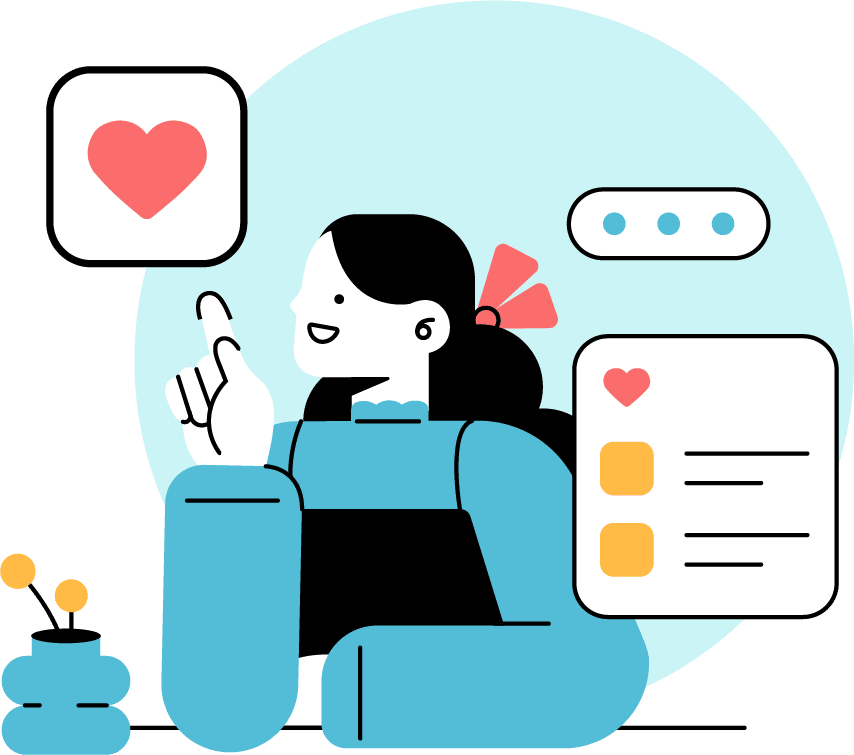If you or a loved one is struggling with managing depression and anxiety, or other psychological issues, it may be time to look into online mental health treatment programs — particularly if you suspect that co-occurring disorders may be present. Co-occurring disorders can have symptoms that make both conditions worse. Additionally, they can be difficult to manage or treat, even with professional help.
Many cases of co-occurring disorders include addiction as one of the two conditions. In fact, studies show that about half of all people with substance use disorders (SUD) also suffer from another mental health issue. Whether or not addiction is involved, it’s estimated that about 9 million Americans have co-occurring disorders. Searching for online mental health treatment programs in California? Reach out to Clear Behavioral Health Virtual Program today. You can call 866.680.0969 or contact our team online.
What Are the Common Co-Occurring Mental Health Disorders?
Co-occurring disorders can also be called a dual disorder or dual diagnosis. Co-occurring disorders refer to having two or more co-existing mental health issues. While cases of co-occurring disorders commonly include substance use disorders, other combinations exist. For example, a mental health disorder and a developmental disability can be co-occurring disorders.
When a dual diagnosis occurs, the severity of each condition may differ from each other, and may also change over time. Compared to clients with a single disorder, those with a combination of disorders may experience more severe physical and mental health challenges and may require more extended treatment periods. Clients with co-occurring disorders are at high risk for developing additional problems — such as family problems, financial challenges, homelessness, incarceration, sexual and physical victimization, social isolation, symptomatic relapses, and serious physical health issues.
Mental health conditions that commonly co-occur with SUDs or with each other include the following:
- Bipolar disorder: This is a chronic mood disorder characterized by variations in activity, energy levels, and mood. Clients struggling with bipolar disorder alternate between episodes of mania and depression, often for their entire lifetimes. The dramatic mood swings that affect people struggling with bipolar disorder can make it more likely for them to develop other mental health issues.
- Depression: It’s estimated that one out of three Americans who struggle with substance abuse also have depression. Like with people struggling with GAD, the use of alcohol and drugs helps people struggling with depression feel better temporarily. Still, it ultimately leads to addiction and the worsening of depression symptoms.
- Generalized anxiety disorder (GAD): Clients struggling with GAD experience frequent anxiety or panic attacks in the absence of any real danger. They can suffer symptoms like an inability to function, sleep disturbance, and restlessness. Studies show that clients struggling with GAD frequently self-medicate with drugs and alcohol.
- Eating disorders: In the U.S., eating disorders affect approximately 30 million people, two-thirds of which are women. These disorders are characterized by abnormal eating patterns. Anorexia and bulimia are particularly common eating disorders that adolescents may struggle with, and their symptoms may significantly affect both mental health and physical health.
- Posttraumatic stress disorder (PTSD): This can develop in clients who have experienced or witnessed a traumatic event. Symptoms can make it difficult for clients to go through daily living, and it’s estimated that two out of three people struggling with PTSD will also struggle with a SUD.
- Psychotic disorders: Schizophrenia is likely the more well-known psychotic disorder. It’s characterized by symptoms like delusions, disorganized behavior, and hallucinations. People with schizophrenia are frequently unable to attend school or work, function socially, and maintain healthy relationships.
How Does Online Treatment Help in Managing Depression and Anxiety?
In general, the combination of co-occurring disorders that’s most typical — apart from those that include SUDs — is anxiety and depression. While this combination can be difficult to recognize, especially early on in their development, professional help does help in reducing symptoms of both. This type of help can be offered on-site or online by healthcare providers.
Telehealth is a mode of service delivery that’s been used in clinical settings for over 60 years, but it’s recently been put in the spotlight due to the pandemic. This mode of delivery increases the accessibility of services that provide screening, assessment, treatment, recovery support, crisis support, and medication management to clients across diverse behavioral health and primary care settings. Clients may experience many benefits from receiving mental health treatment through telehealth, such as the following:
- Increased access to experienced mental healthcare providers and high-quality care
- Improved continuity of mental healthcare
- Increased convenience that removes traditional barriers to mental healthcare
As depression and anxiety can have debilitating symptoms that can sometimes result in difficulty getting out of the house or even scheduling mental healthcare appointments, online options can definitely help in making sure clients receive the help they need.
When Should You Consider Online Mental Health Treatment Programs?
There are many reasons clients that struggle with common mental health disorders opt for online therapy. The following are some of the advantages of online mental health treatment:
- As effective as in-person mental health treatment
- Convenience and affordability
- Increases accessibility of professional help to clients living in remote areas
- Increases accessibility of professional help to clients with physical limitations
- More approachable than in-person mental health treatment
Online mental health treatment programs can be less intimidating than in-person options, especially for clients still affected by the social stigma of going to therapy. Even if you feel like your mental well-being is strong, online therapy can still help you become psychologically stronger and even improve your quality of life — so consider at least going in for an assessment and a possible diagnosis.
Ready To Learn More About Clear’s Online Mental Health Treatment Programs?
Mental health struggles can have a significant impact on overall quality of life. Our Virtual IOP programs are designed to help individuals manage mental health conditions like anxiety and depression by incorporating a range of therapeutic modalities and teaching healthy coping mechanisms. If you’re looking for online mental health treatment programs in California, contact Clear Behavioral Health’s Virtual Program today. You can call 866.680.0969 or reach out to our team online.




